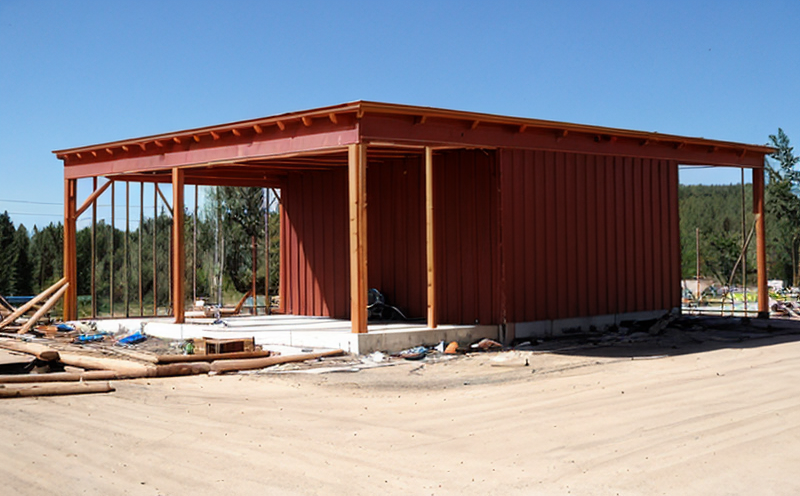ISO 9934 Magnetic Particle Testing of Castings
The ISO 9934 standard provides a robust framework for detecting surface and near-surface defects in cast iron components. This method is particularly useful in the metallurgy sector, where structural integrity is paramount. Magnetic particle testing (MPI) leverages magnetic fields to reveal flaws that may not be visible through other non-destructive testing methods.
The process involves applying a magnetic field to the casting and then dusting it with iron filings or using a liquid suspension of particles. The presence of defects disrupts the magnetic field, causing the surrounding particles to form distinct patterns called "magnetic signatures." These signatures can indicate the location, size, and shape of defects.
For castings used in critical applications such as automotive engines, aerospace components, or heavy machinery, ensuring structural integrity is crucial. ISO 9934 ensures that these components are free from imperfections that could lead to failure under operational stress. The testing process can be customized based on the specific requirements of the casting and the industry it serves.
Preparation for MPI involves cleaning the surface of the casting, applying a magnetic field, and then inspecting the area for any anomalies. This method is non-destructive, allowing for multiple inspections without compromising the integrity of the component. The testing process can be automated or conducted manually, depending on the facility's capabilities.
The ISO 9934 standard specifies detailed procedures for both wet and dry processes. Wet methods involve using a magnetic suspension to enhance visibility, while dry methods use loose particles that adhere to the casting surface. Each method has its advantages, with wet methods being more versatile in complex geometries and dry methods offering better access.
Understanding the requirements of ISO 9934 is essential for quality managers and compliance officers ensuring the reliability of cast iron components. For R&D engineers and procurement specialists, this testing ensures that materials meet stringent standards before entering production or supply chains.
The standard provides a framework for consistent and reliable defect detection, which is critical in industries where safety and performance are paramount. By adhering to ISO 9934, manufacturers can demonstrate compliance with international quality standards, ensuring trust among customers and stakeholders.
Why It Matters
The integrity of castings directly impacts the reliability and safety of products in various industries. Defects in cast iron components could lead to catastrophic failures, resulting in significant financial losses and potential harm. By adhering to ISO 9934, manufacturers can ensure that their products meet rigorous quality standards.
- Magnetic particle testing is an effective way to detect surface and near-surface defects without damaging the casting.
- The standard provides a uniform approach for defect detection across different facilities and regions.
- Compliance with ISO 9934 enhances brand reputation by ensuring consistent product quality.
- This method supports regulatory compliance, which is essential in maintaining market access and customer trust.
In critical applications such as aerospace and automotive industries, the safety of components cannot be overstated. The ability to detect even minute defects through MPI ensures that only reliable products reach the market.
The standard also plays a vital role in R&D by providing a benchmark for comparing different materials and processes. This information is invaluable for continuous improvement and innovation within manufacturing processes.
Eurolab Advantages
EuroLab offers comprehensive ISO 9934 testing services tailored to the needs of our clients in the metallurgy sector. Our team of experts ensures that every test adheres strictly to the ISO 9934 standard, providing reliable and consistent results.
- Comprehensive Testing Capabilities: EuroLab provides a full range of testing services, including wet and dry methods, ensuring flexibility in meeting specific client requirements.
- Expertise in Materials: Our skilled professionals have extensive experience with cast iron components, allowing us to provide accurate and actionable insights.
- State-of-the-Art Equipment: We utilize cutting-edge equipment and technology to ensure precise testing results. This includes advanced magnetic field generators and high-resolution cameras for detailed inspection.
- Compliance and Reporting: EuroLab ensures full compliance with ISO 9934, providing detailed reports that meet regulatory requirements and industry standards.
- Custom Solutions: We offer customized testing solutions to address the unique needs of each client, whether it's for R&D or routine quality control.
- Training and Consultation: EuroLab provides training sessions and consultation services to help clients understand and implement ISO 9934 effectively.
Our commitment to quality and customer satisfaction sets us apart in the industry. By choosing EuroLab, clients can be assured of reliable testing that meets international standards.
Competitive Advantage and Market Impact
- Enhanced Product Quality: Adherence to ISO 9934 ensures that products meet the highest quality standards, providing a competitive edge in the market.
- Informed Decision-Making: The insights gained from MPI can inform R&D and production processes, leading to continuous improvement and innovation.
- Regulatory Compliance: By meeting ISO 9934 requirements, EuroLab helps clients avoid penalties and maintain market access.
- Customer Confidence: Consistent quality ensures that customers trust the reliability of the products they receive.
EuroLab’s expertise in ISO 9934 testing provides a strong foundation for competitive advantage. Our services are in high demand, reflecting their value and impact on the market. By choosing EuroLab, clients gain access to a team that understands the nuances of metallurgy and material testing, ensuring they remain at the forefront of industry standards.





